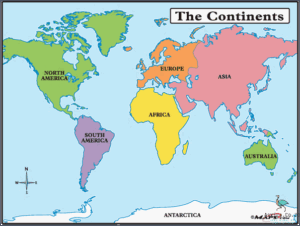
The Spanish language is the official language of the nation of Equatorial Guinea. It is spoken by more than 50% of the population and is the predominant language in the capital city, Malabo. Equatorial Guinea is the only African country whose official language is Spanish.
Contents
- 1 The Only Country In Africa Whose Official Language Is Spanish.
- 2 Historical Background: How Spanish was made the official language of Equatorial Guinea
- 3 Current Situation: How Spanish is used within the country today
- 4 Effects of Spanish Language on Equatorial Guinea: Cultural and Political Implications
- 5 Conclusion
The Only Country In Africa Whose Official Language Is Spanish.
Equatorial Guinea is the only country in Africa whose official language is Spanish. It is located in Central Africa, bordered by Cameroon and Gabon. Its capital is Malabo, and the population is made up of various ethnic groups, with one of the largest being the Fang people. This country is one of the smallest in Africa and has a rich culture, with Spanish being the primary language of communication. Spanish is also the language of instruction in the country’s educational institutions. Equatorial Guinea is a small but prosperous nation and has experienced significant economic growth in recent years. The government also has implemented various initiatives to promote Spanish language and culture.
Historical Background: How Spanish was made the official language of Equatorial Guinea
The African nation of Equatorial Guinea is the only country on the continent where Spanish is the official language. This is a fascinating fact, given the country’s complex history and diverse population. To understand how Spanish became the official language, one must first look at the country’s past.
Equatorial Guinea has a long and complicated history. It was first populated by the Bantu people, who were later joined by the Fang people. During the 15th century, the Portuguese arrived in the area, and by the early 18th century, the Spanish had claimed the territory. Spanish colonizers imposed their language on the population, and it eventually became the official language.

The country’s language and culture were further influenced by the arrival of Europeans in the 19th century. French, German, and British companies established trading posts and plantations in the region. These companies brought with them laborers from other parts of Africa and Europe, and the result was a diverse population with a variety of languages and cultures.
In 1968, Equatorial Guinea gained independence from Spain and the official language became Spanish. The government was keen to promote a national identity and chose to make Spanish the language of instruction in schools and the language of government. Although other languages are spoken in the country, such as Fang, Pidgin English, and French, Spanish is the language of official business and of the media.
In recent years, the government has taken steps to promote the use of Spanish and to encourage the teaching of the language in schools. This has allowed for the growth of Spanish-speaking education and the continued use of the language in official circles.
Equatorial Guinea’s complex history and diverse population have made it a fascinating place to visit. Its unique language and culture are part of what makes it such a unique destination. The fact that Spanish is the official language is a testament to the country’s past and its desire to promote a unified identity.
Current Situation: How Spanish is used within the country today
When it comes to the languages spoken in African countries, Spanish is not generally the first to come to mind. However, there is one country in Africa where Spanish is the official language: Equatorial Guinea. This small, West African nation is the only African country to have Spanish as its official language.

This is largely due to the country’s colonial past. Equatorial Guinea was once a Spanish colony, and it wasn’t until 1968 that the country gained independence. During the colonial period, Spanish was the language of government, education, and commerce. After independence, the country kept Spanish as its official language, and it has remained so ever since.
Today, Spanish is the language of government, business, media, and education in Equatorial Guinea. All official documents and proceedings are conducted in Spanish, and most of the population speaks Spanish as a first language. It is estimated that around 95% of the population of Equatorial Guinea speaks Spanish, with the remaining 5% speaking either other indigenous languages or French.
Despite the prevalence of Spanish, some local languages are still spoken in Equatorial Guinea. These include Fang, Bubi, and Ibo. These languages are primarily spoken in rural areas, and some have been declared official languages of the country. However, Spanish is still the dominant language in Equatorial Guinea and is used in all official government communication.
As one of the few African countries to have a European language as its official language, Equatorial Guinea stands out. Spanish is an important part of the country’s culture and identity, and it is likely to remain so for years to come.
Effects of Spanish Language on Equatorial Guinea: Cultural and Political Implications
The African nation of Equatorial Guinea is the only country in the continent whose official language is Spanish. The linguistic legacy of Spanish colonization has had a significant impact on the culture and politics of the country. This article explores the effects that the Spanish language has had on Equatorial Guinea and the implications it has on the country’s cultural and political landscape.

When Spanish colonists first arrived in Equatorial Guinea in the 16th century, they brought their language with them. They quickly established Spanish as the official language of the country, displacing the native languages of the region. This has had a profound effect on the culture of Equatorial Guinea, as it has largely replaced the traditional languages spoken by the locals and has become the primary language of communication.
The presence of Spanish in Equatorial Guinea has also had an impact on its politics. Spanish is the language of the government, and all official documents must be written in Spanish. This has created a language barrier for many citizens, as the majority of the population does not speak Spanish. This has led to a lack of political representation and has limited the ability of citizens to engage in their government.
The Spanish language has also played a role in the economy of Equatorial Guinea. Since Spanish is the official language of the country, it is the language of commerce and trade. This has attracted many investors and businesses to the country and has helped to bolster the economy.
Finally, the presence of Spanish in Equatorial Guinea has had an impact on its culture. Spanish is the language of instruction in schools, and it is the language used in public discourse. This has led to a blending of Spanish and the traditional languages of the country, creating a unique cultural identity.
In conclusion, the effects of Spanish language on Equatorial Guinea are far-reaching and complex. It has resulted in a language barrier that limits political representation, an influx of foreign investment, and a unique cultural identity. As Equatorial Guinea continues to develop, it is likely that the effects of Spanish language will continue to be felt in the cultural and political landscape of the country.
Conclusion
The Spanish language is the official language of the Republic of Equatorial Guinea. This country is unique in that it is the only African country whose official language is Spanish. This fact reflects the historical ties between Spain and Equatorial Guinea, as well as the country’s importance as a regional trade hub. Equatorial Guinea’s Spanish language status is also important in terms of international diplomacy and trade.




